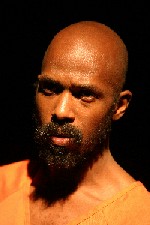
Biro: Uganda's Story
The Monitor (Kampala) January 30, 2003

By Doreen Baingana
From the first word uttered by a thin bearded man in orange prison clothes, all alone on stage, to his last plea one and a half hours later, I was completely absorbed by the life story of Biro.
The tragic tale is based mostly on the real story of a man the actor, Ntare Guma Mbaho Mwine, knew and interviewed. Mwine also wrote and co-produced the play. His hard work and brilliant talent are obvious throughout.
The play, a monologue, starts with Biro in an American jail asking a lawyer to represent him. Biro directs the plea to the audience, and in one stroke, we become part of the play. We are to judge whether Biro has a case, and even more, to re-live with him, the choices and chances he had as life rode roughshod over him. Biro traces his life from rebellious student to rebel soldier, when he gets HIV/AIDS. He finally immigrates to the United States illegally to receive medical care, but ends up in prison. It is a fascinating story, and Biro is an eloquent story teller; at once candid, emotional and funny, while also astutely voicing political opinions that place his story into the larger context of Uganda's recent history.
Ntare Mwine is Biro from the minute he first speaks with a thick Kinyankore accent, which could have easily become comic in the mouth of a lesser actor). One would never know that Mwine's natural accent is American; which was where he grew up. Beyond this, Mwine creates and embodies his character by using particular hand gestures and shoulder and head twists that show the care and skill at which he prepared for the part. It is even more amazing then when Mwine, with a mere turn of the head or shift in pitch becomes Biro's commander, or Museveni, or Biro's Black American brother-in-law, or a female boss from the American south, and then becomes Biro again. These astounding character flips alone are worth the trip to the national theatre.
The fine acting is supported by subtle lighting changes that help create shifts in mood and narrative; making the move from scene to scene, as it were, perfectly seamless. The simple staging play is a fine example of how theater need not be lavish to be good. In addition to recorded music, photographs projected off two huge screens complement Biro's story. A photo of America's prime symbol, the Statue of Liberty, shown while Biro told us his travails in the United States, added ironic commentary without a word. Some of the pictures were taken by Mwine and deserve a show of their own. What doesn't this man do? As a playwright, he has tackled a number of huge topics, each of which could have been a separate play. I sense an urgency; there is so much to be told, to be argued over, to be exposed.
One main criticism is the playwright's treatment of his women characters. I thought Biro's reaction when his mother wanted to take him out of the 'bush' a little too extreme. Anger, yes, but extended abuse? That was unnecessary. Further, we learn that the rebel soldiers slept with tons of women who were passed down the ranks. I commend Mwine for including this abhorrent part of the lauded NRA guerrilla war for democracy. But, even though the soldiers treated the women as objects, to say the least, the playwright need not have done so as well. He could have let us see or hear just one of these women, thus making them human, just as Mwine gave voice to Biro's good friends, as Biro mourned for them. What about the mother of Biro's child, for instance? Biro is inspired to live on and work for the sake of his child, but has only one thing to say about the mother, "Maybe I gave her AIDS."
The play is more than Biro's story; it is Uganda's story. The wars, in the bush and out, the AIDS epidemic, the hope of a better life abroad. We all have experienced this story, in one way or another. Is this material all too familiar, at least for a Ugandan audience? I would say not. The play Biro is our life reflected back at us through art. It gives us a chance mourn our families, friends and country together. It is a rebuttal against forgetting our past, however painful it may be. Biro is surely going to join the ranks of Uganda's major theatrical performances.

